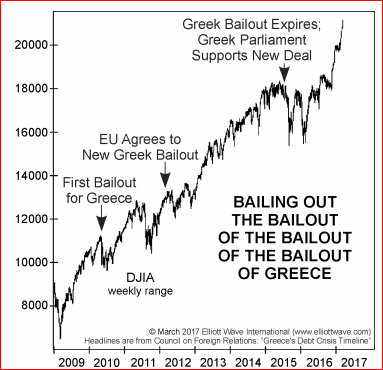IS WALL STREET'S SWAMP BEING DRAINED?
At the end of her interview with Lobo Tiggre, Danielle DiMartino Booth urged investors to listen to companies and their CFOs. When they begin saying they are going to work on their balance sheets, that’s code for paying down debt and will be the end of share buybacks.
As DiMartino Booth puts it, companies will then be taking care of bond holders rather than shareholders. The implication is the liquidity driving the bull market will seize up and a market correction is on the way.
Right on cue was Almost Daily Grant’s with a discussion of AT&T's Q1 results.
Eager to avoid a credit-rating downgrade, management is now prioritizing the paydown of that debt load. In the earnings release, CEO Randall Stephenson reported that the company is “on plan to meet our de-leveraging goals with strong free cash flow and asset sales.” Concurrent with today’s first quarter results, AT&T announced it will sell office space at 30 Hudson Yards, the third-tallest building in New York, to real estate firm Related Cos. for $2.2 billion.
AT&T’s newfound emphasis on balance sheet repair at the expense of growth comes as no surprise to Craig Moffett, co-founder and one-half eponym of research firm MoffettNathanson, LLC. Speaking at the Grant’s fall 2018 conference, Moffett said AT&T will be forced to pivot toward shareholder unfriendly strategies in the pursuit of debt reduction. The analyst noted that even after coughing up that hefty price tag for Time Warner, the Street’s expectation for fiscal 2019 adjusted EBITDA remained below where it had been at the end of 2016, i.e. prior to the merger.
Grant’s then goes on to quote Bernstein Research,
U.S. equities are highly dependent on buybacks. 2018 saw $1 trillion of buybacks announced by U.S. companies compared to a total net flow of all active and passive funds of ‘merely’ $100 billion. Many investors seem comfortable that, with the Fed on hold, U.S. corporates can merrily carry on issuing issuing triple-B-rated debt and buying back stock. We disagree.
The low quality of U.S. corporate debt plus a slowing in growth, we think, leads to rising credit spreads over the next 12 months which [will] in turn put the kibosh on buybacks.
Perhaps Wall Street’s swamp is about to be drained.






